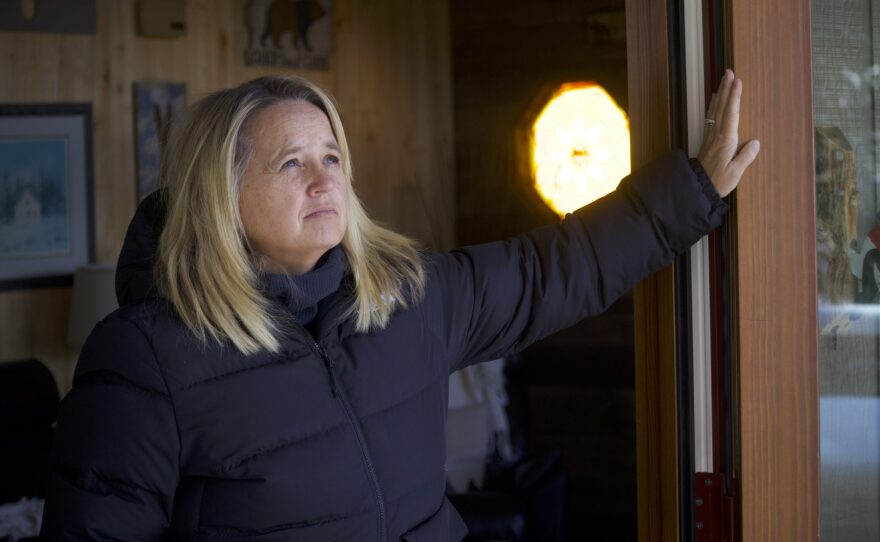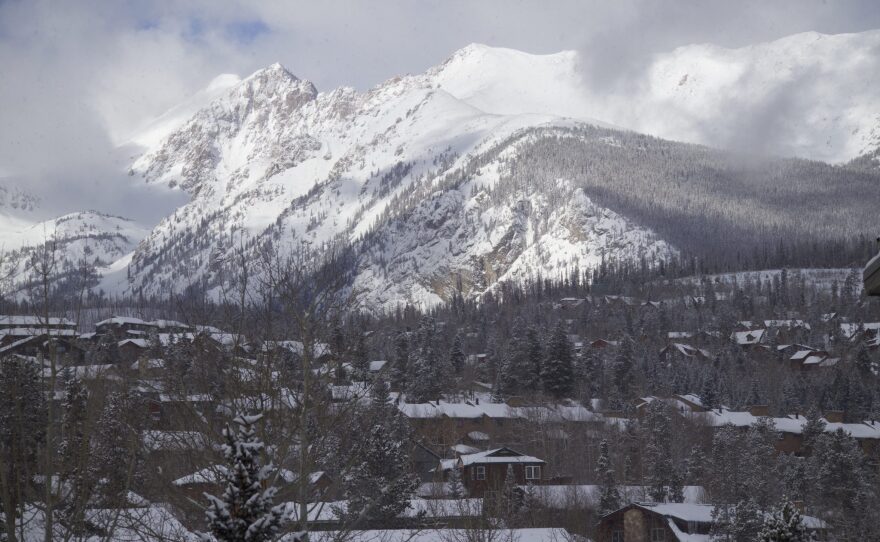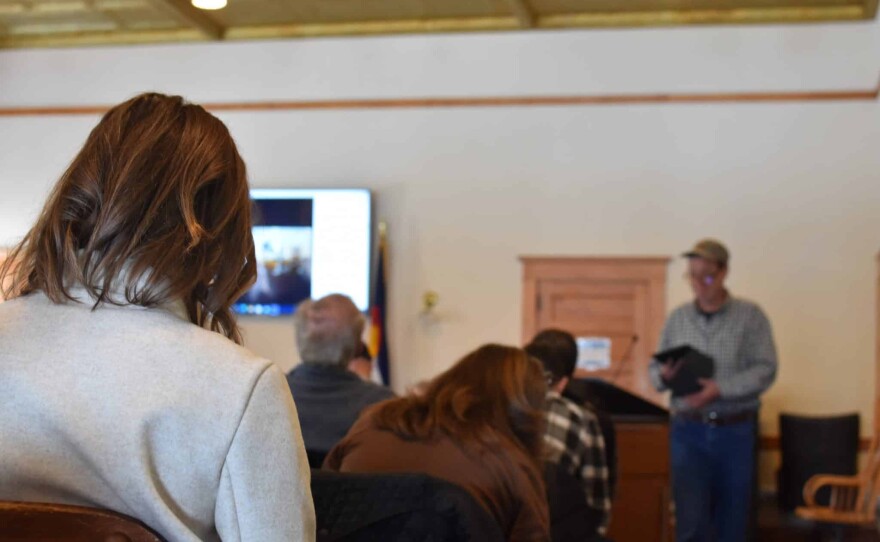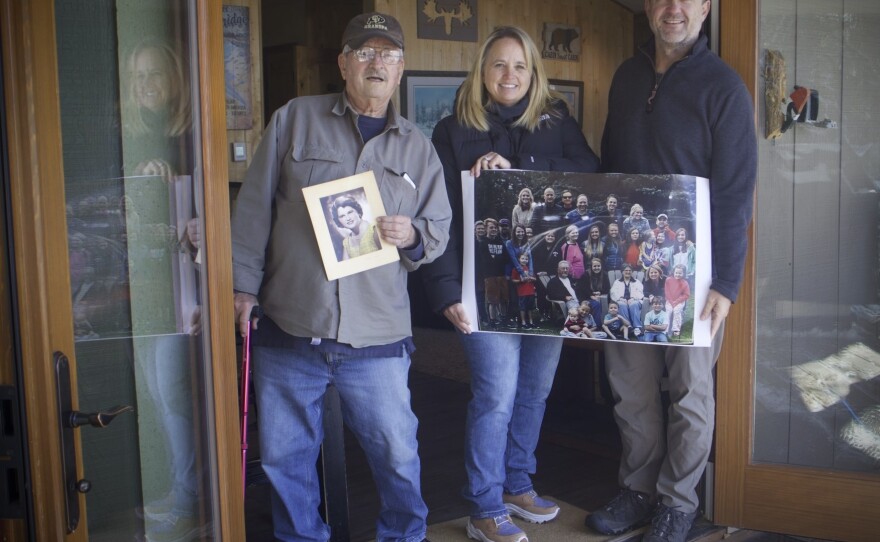Laura James's Breckenridge home is dotted with 45 years of family memories.
A pot-bellied stove stands in the basement where, as a child, James smelled the aromas of coffee and oatmeal as it heated. A pair of 1970s snowshoes that belonged to her dad now decorate a wall. Warm light pours into the living room through her late mother's handmade stained glass window.
When James and her husband purchased the home from James's parents in 2016, they had every intention of making new memories by keeping it in the family. In order to afford the property in addition to their primary residence in Colorado Springs, James said they turned to short-term renting.
"We're not a big corporation. This is a family dream," James said. "Our revenue is solely to cover our mortgage, our expenses and our employment of local workers."
The couple made it work for years. But now, under new short-term rental regulations in Summit County, James said they're concerned about the ability to hold onto their Breckenridge property.
In February of last year, the Summit Board of County Commissioners approved a package of short-term rental regulations in response to what they've called a growing workforce housing crisis for residents. The rules, which went into effect this past fall in unincorporated Summit County, place varying caps on the number of licenses needed to operate a short-term rental and limit the number of bookings a property can have within a year.
In a statement, Commissioner Tamara Pogue said the board "promised the public that they would review the county's current regulations after they had enough data to share, so the board could evaluate their success," adding that county staff is currently gathering that data.
Pogue stated, "A review of sales tax data indicates stability and strength in the sector. Sales tax from short-term lodging category in January 2024 was not only the largest January, but the third highest month overall, in the past five years."
The county now joins a bevy of other mountain resort governments that have implemented short-term rental restrictions. Other policies are in effect in most of the county's towns — including Breckenridge, Frisco and Silverthorne — as well as resort areas like Steamboat Springs and Aspen.
"I know that short-term rentals are a necessary part of our tourism industry," said Colorado House Speaker Julie McCluskie, who represents High Country communities, including Summit, in the state legislature.
"Travelers that come to Colorado, their families are looking for that short-term rental unit that is more than just a typical or standard hotel room," she continued. "So achieving the right balance between the number of short-term rentals and how they're being used in our local, working neighborhoods is really important to me."
But some short-term rental owners fear the new rules will do more harm than good.
Already this season in Summit County, owners say they've seen a loss in revenue at a time when home costs are on the rise. If homeowners decided to sell, they're doubtful the homes will go to working residents given their properties' high market value. And some feel a decline in short-term rentals will hurt the resort economy since the county relies heavily on tourism.
"Affordable housing for locals in Summit County is an issue," said Hunter Foreman, who owns and operates a short-term rental in Wildernest just outside the town of Silverthorne.
"But by imposing short-term rental regulations on the people that are providing places for people to stay for all these vacationers in a tourist town," he continued, "we are going to have extremely negative trickle-down effects."
'Not a cash cow'
In 1976, James's parents built what would become the first home in the Peak 7 neighborhood that hovers high above the town of Breckenridge.
While the family's main home was in Colorado Springs, James remembers spending much of her childhood at the Breckenridge property that the family always referred to as "The Cabin." Between James' parents, her siblings and now her sibling's children, the cabin has become a multigenerational destination.
In 2016, James and her husband decided to purchase the property from James's parents, taking on the mortgage.
"We had to develop a business case. How can we keep it in the family? That was our primary goal," James said.
The answer was to convert the two-bedroom, three-bathroom home into a vacation rental, with the family able to use it themselves during the off-season.
"It's not a cash cow," James said. "It is a way to pay off the mortgage, to pay the local workers and to preserve family heritage."
Between paying for a mortgage and a handful of employees, the couple usually sees their net revenue cut in more than half year over year, according to financial data they shared with the Summit Daily News. Whatever income is derived afterward goes into a capital improvements fund that has paid for a roof replacement, window repair and general wear and tear, James said.
Under the new county regulations that went into effect last fall, the couple is projecting a decrease in total revenue compared to the 2022-23 season. It could mean that, for the first time, their revenues drop below expenses.
The loss is being driven, James said, by a rule that limits bookings for short-term rentals to no more than 35 per year. County officials, when they approved the rule as part of the new regulations last year, said it was aimed at mitigating noise and other complaints related to short-term rentals in neighborhoods.
Over the past three years, James's bookings have far exceeded 35. In 2021, she had 58 bookings. In 2022 and 2023, she had 54 and 41, respectively.
This season, James said her bookings have already hit the 35-booking limit, meaning that the couple is staring down a 42% decrease in revenue compared to last season unless there are cancellations and new bookings can be made.
To mitigate the loss of income, they've increased their minimum stay from two to five nights to capture more business within a single booking. But James worries the change has made it more difficult for an average family in Denver, who may only want to ski a weekend, to come to the mountains.
"The longer stays drove 100% out-of-state (visitors)," James said. "No longer, this fall, were we able to serve the local Coloradans."
Still, the increased nightly minimum won't be enough to restore the lost income. It comes as James's expenses continue to rise, a trend that, should it continue, may mean she has no choice but to sell.
"We are absolutely at risk, with the projected 42% decrease in revenue, of losing our family home and our family heritage," James said.
In August, James joined with dozens of other short-term rental owners in filing a lawsuit against the county in an attempt to undo the regulations. The case is currently making its way through federal court, with county attorneys seeking to dismiss the litigation.
Short-term renting only way to 'justify the cost'
Foreman, who owns the short-term rental in Wildernest, said it had long been his dream to have a home in the mountains. Born in Denver but raised in the Midwest, Foreman said Summit County has been a "second home away from home for me my entire life."
The county served as a regular vacation destination for winter and summer breaks for Foreman's family during the late 1990s and early 2000s. He remembers learning to ski at Arapahoe Basin Ski Area and seeing the Frisco Marina before it was developed.
In 2018, Foreman moved to Denver where he lives today. At the time, he knew he wanted to buy a home in Summit so that he could "do what my family had done for me for future generations."
But, "as with a lot of mountain homes, the only way you can justify the cost of those homes is to rent it out short-term when you're not using it," Foreman said.
With this plan in mind, Foreman purchased a six-bedroom, three-and-a-half-bath log cabin property in Wildernest in 2021. Foreman said pitching the property as a vacation rental was part of how he was able to secure a loan from the bank to afford his down payment.
While short-term renting has allowed Foreman to reach his dream, it's continued to present a financial challenge. This year, under the new regulations, Foreman said he's worried he may not be able to break even.
Financial reports shared with the Summit Daily show that between November 2023 and March 2024, Foreman's net-income decreased more than 70% compared to that same time period in 2022 and 2023.
Foreman said the reason could be because of an increase to his nightly rates, something he said was a response to the new booking limit. Previously, Foreman's minimum rates hovered around $500 during peak winter and spring times and $300 in the summer months. Now, those minimums stand at around $750 and $550, respectively.
The struggle to offset his home costs has only intensified amid heightened costs that include a surge in property taxes. For short-term rental owners in a similar circumstance, Foreman believes it will get "harder and harder for people to justify the financial aspect, and they're going to start selling."
Foreman said that could have negative impacts on the resort economy, which he says are stimulated in-part by short-term rental properties. For his part, Foreman estimates he rents to roughly 100 families every year. With a property that can house up to 10 people, that could mean around 1,000 people each year.
"Summit County, when you think about it — it's a tourist town, it's a vacation town," he said. "A lot of these businesses thrive on guests coming and staying in short-term rentals and spending money at local businesses."
A tightrope between tourism, housing
How to balance the short-term rental market in resort communities has become a legislative headache not just for local officials but state lawmakers as well.
This year, twin bills were introduced at the Colorado State Capitol that, if passed, could quadruple the taxes short-term rental owners pay.
Senate Bill 33, one of the more controversial measures introduced this legislative session, would reclassify short-term rentals that have more than 90 nightly stays per year from a residential property tax rate to the much higher lodging tax rate.
The bill, which is now likely to be heavily amended, received major pushback from the industry and short-term rental owners, and neither of Summit County's state legislators, Speaker McCluskie or Sen. Dylan Roberts, said they would support it in its current form.
The second proposal, House Bill 1299, would only apply a lodging tax rate to short-term rental owners operating multiple properties. It means that a second-home owner who short-term rents would still be taxed at a lower residential value, but those with three or more homes would pay a lodging tax akin to a hotel.
The bill's philosophy is that corporate investment properties eating away at local housing supply should pay more in taxes as opposed to second-home owners trying to keep a foothold in communities.
While the bill aims for a more equitable approach than 33, Roberts said both proposals are "taking a sledgehammer to an issue that might need a little more precision to that," adding, "I do have a little hesitation about a statewide short-term rental policy, to be quite honest."
Roberts said he prefers to leave the issue in the hands of local governments who can manage the unique needs of their communities better than a blanketed state solution. But threading that needle becomes difficult given the complex ecosystem of resort areas.
In Summit County, for example, short-term rentals supported more than 7,000 jobs in 2022, with overnight visitors paying a combined $70.7 million in local sales, lodging and short-term rental taxes, according to a recent study commissioned by the Western Mountain Resort Alliance.
The number of rental properties in the county has proliferated in the last decade, rising from 635 at the end of 2014 to 10,425 at the end of 2023, according to a countywide housing study published at the end of last year.
At the same time, county residents have reported losing housing to short-term rentals. Of the more than 2,280 people surveyed for the county's housing study, just over a quarter said they weren't able to renew their lease because their unit was converted to a short-term rental.
Roberts said local and state officials have worked to combat that issue and pointed to a new state law that will allow counties to provide property tax rebates to homeowners for myriad reasons — one of which could be to incentive converting short-term rentals to long-term leases.
The legislation was proposed by Summit County officials and sponsored by both Roberts and McCluskie. Still, Roberts said the short-term rental debate is far from over and will take creative approaches to reach solutions.
"Are there units of housing that used to be long-term rentals for workers or used to be homeownership opportunities for locals that were converted to short-term rentals? Of course," Roberts said. "Is it the only reason for our affordable housing issues? Absolutely not."
Mountain resort communities "need a vibrant tourism economy in our mountain communities," he continued. "Each local town knows what's best for their tourism economy rather than a statewide policy."
'We want to be a part of the solution'
Any significant decline in Summit County's short-term rental stock isn't likely to happen immediately based on how the county's regulations were written.
The county placed limits on the number of short-term rental licenses that can be issued in different basins, with a ceiling ranging from 5% to 18% of the total housing inventory in those areas. Officials believe they will meet those thresholds by 2030 through natural attrition, which means a license will be permanently removed in an area that is over its cap after an owner chooses not to renew.
The regulations do not place a cap on short-term rentals operating in what officials refer to as "resort overlay zones," which account for around 60% of all active short-term rentals in the county.
Those areas include Copper Mountain and Keystone, though the latter recently became an independent town whose representatives could choose to implement a cap at some point. Exemptions to the caps are also in place for working residents and retirees who short-term rent their primary home.
New licenses issued in resort overlay zones drove an increase in the total number of active short-term rentals in Summit County this season compared to last.
According to county Communications Director Sarah Wilkinson, there were 4,188 licenses issued in the unincorporated county as of Oct. 1, 2023 compared to 3,962 licenses issued in 2022. The renewal period for short-term rentals happens every fall.
Still, short-term rental advocates say if their market shrinks in the coming years it could have detrimental impacts on Summit County's tourism-driven economy.
"We live in a community that was built on the back of short-term rentals and the ski industry," said Julie Koster, executive director of Summit Alliance of Vacation Rental Managers, which represents more than 4,500 vacation properties in Summit County. "A cap on short-term rentals is a cap on growth for all businesses in this community."
Short-term rental owners are skeptical that current policies will do much to aid working residents who are in need of long-term, affordable housing.
James, who owns the Peak 7 home near Breckenridge, said short-term renting is what allows her family to still use the property and said converting it to a long-term rental "is not an option that is on the table."
"This defeats the purpose as our family would not be able to use the cabin," she said.
Foreman, who owns the Wildernest home, said an explosion in property values means larger homes that serve as short-term rentals won't be affordable to working residents if those properties were to be put up for sale.
His six-bedroom cabin was valued at just under $870,000 in 2022 and now stands at around $1.5 million, a 72% increase. He believes a home sold at that price would likely go to a second-home owner.
"It's going to be replaced by somebody who comes up here for two weeks out of a year and spends a tenth of the amount that all the renters that come up here in Summit County spend," Foreman said.
Koster said her group is supportive of county programs like Lease to Locals, which provides grant incentives to homeowners to convert their short-term rentals to long-term housing, adding, "We want to be a part of the solution, not a part of the problem."
But she also acknowledged for some Coloradans, short-term renting is their means of making Summit County a second home. According to the study commissioned by the Western Mountain Resort Alliance, nearly half of all short-term rentals, 46%, were owned by Front Range residents in 2023.
"I think these folks who come here, who own property here, deserve to feel like they're made to belong here," she said. "They love the mountains just like we do."





